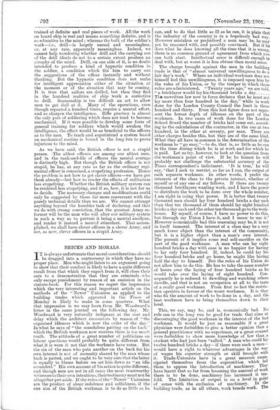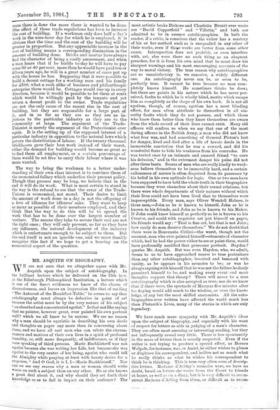BRICKS AND MORALS.
IT is always unfortunate that moral considerations should be dragged into a controversy in which they have no proper place. Men who might listen to an argument going to show that their conduct is likely to have a quite different result from that which they expect from it, will close their ears to a demonstration that they are criminals . who only escape punishment by reason of an omission in the statute-book. For this reason we regret the impression which the very interesting and important article on the methods of the " Newer " Unionism as applied to the building trades which appeared in the Times of Monday is likely to make in some quarters. What that impression is we may learn from Mr. Woodward's letter in the same journal on the following day. Mr. Woodward is very naturally indignant at the cost and delay which the architect encounters by reason of "the organised idleness which is now the order of the day." In what he says of "the scandalous patting on the back which the British workman now receives there is too much truth. The attitude of a great number of politicians on labour questions would probably be quite different from what it is were it not that the workmen have votes. But the sin of the man who pats another on the back for his own interest is not of necessity shared by the man whose back is patted, and we ought to be very sure that the latter is equally to blame before we set him down as "an idle scoundrel." His own account of his action is quite different, and though men are not in all cases the most trustworthy witnesses to their own intentions, their testimony must not be altogether put aside. If the rules of the " Newer " Unionism are the product of sheer indolence and selfishness, if the one aim .of the British workman is to do as little as he can, and to do that little as ill as he can, it is plain that the industry of the country is in a hopelessly bad Way. However mistaken or prejudiced a man may be, he may yet be reasoned with, and possibly convinced. But if he does what he does knowing all the time that it is wrong, there is no common ground of agreement from which you can both start. Intellectual error is difficult enough to deal with, but at worst it is less obtuse than moral error.
The charge brought against the men in the building trade is that of "almost universal unwillingness to do a fair day's work." Where an individual workman does not himself feel this unwillingness, it is imposed upon him by the rules of his Union, or by the temper in which those rules are administered. "Twenty years ago," we are told, "a bricklayer would lay his thousand bricks a day The unwritten law now in force declares that he must not lay more than four hundred, in the day," while in work done for the London County Council the limit is three hundred and thirty. Even this last figure does not repre- sent the lowest depth of idleness on the part of the workmen. In two cases of work done for the London School Board the number of bricks laid came out, accord- ing to the calculations of the contractor, in the one at two hundred, in the other at seventy, per man There are other charges besides this, but they are of the same kind. What they all have in common is the determination of the workman to "go easy,"—to do, that is, as little as he can in the time during which he is at work and. for which he is paid. Let us try, however, to look at the question from the workman's point of view. If he be honest he will probably not challenge the substantial accuracy of the Times correspondent's indictment. It is true, he will say, that I seek to restrict, so far as I can, the output of each separate workman. In other words, I prefer the interests of the class to the private interest, whether of myself or of any one of my fellows. If there are twenty thousand bricklayers wanting work, and I have the power to distribute the work to be done over the whole number, I am right in using that power. It is better that twenty thousand men should lay four hundred bricks a day each than that ten thousand of them should. lay eight hundred bricks a day each and the other ten thousand go to the work- house. By myself, of course, I have no power to do this, but through my Union I have it, and I mean' to use it.' However economically bad this reasoning may be, it is not in itself immoral. The interest of a class may be a very much lower object than the interest of the community, but it is a higher object than a man's own interest. The pursuit of it implies some real self-sacrifice on the part of the good. workman. A man who can lay eight hundred bricks a day with ease is no happier for having to lay only four hundred. If, indeed, he could lay his four hundred bricks and go home, he might like having half the day to himself. But the rules of his Union do not allow him to do this. He has to take the same number of hours over the laying of four hundred bricks as he would. take over the laying of eight hundred. Con- sequently he is reduced to dawdling and watching others dawdle, and that is not an occupation at all to the taste of a really good workman. From first to last the restric- tion operates in favour of the worst workmen. It is they who fix the amount of work to be done in a day, and the best workmen have to bring themselves down to their level.
This, we say, may be, and is, economically bad. No rule can in the long run be good for trade that aims at discouraging the good workman in the interest of the bad workman It would be just as reasonable if a great physician were forbidden to give a better opinion than a general practitioner with no experience, or a great counsel were forbidden to show more knowledge of law than ,a student who had just been "called." A man who could lay twelve hundred bricks a day—if there were such a man— would have a, right to whatever advantages in the way of wages his superior strength or skill brought with it. Trade-Unionists have in a great measure eman- cipated themselves from the superstition which led them to oppose the introduction of machinery. They have learnt that so far from lessening the amount of work there is to be done, machinery has increased it ten- fold. The limitation of output is on a level in point of sense with the exclusion of Machinery. In the building trade, as in all others, work breeds work. The rnere there is dime the more there is wanted to be done. 0-ne effect of these trade regulations has been to increase the coSt of building. If a workman only does half a day's work in the nine-hour day for which he is employed, it is obvious that the time and the cost of the building will be greater in proportion. But any appreciable increase in the cost of building means a corresponding diminution in the amount of building done. Bricks and mortar have always bad the character of being a costly amusement, and when a naan hears that if he builds to-day he will have to pay some 30 or 40 per cent, more than he would have paid ten or fifteen years ago, he will in a great number of cases put up with the house he has. Supposing that it were possible to build a decent cottage for a working man and his family for £100, what a rush alike of business and philanthropic enterprise there Would be. Cottages would rise up in every direction, because it would be possible to let them at rents which would be willingly paid by the tenants and, yet return a decent profit to the owner. Trade regulations are not the only cause of the recent rise in the cost of building, but they are responsible for a large part of it, and in so far as they are so they are as in- jurious to the particular industry as they are to the community at large. The argument of the Trade- Unionist is merely the argument of the Protectionist over again. It is the setting up of the supposed interest of a particular industry in opposition to the natural laws which govern the distribution of labour. If the twenty thousand bricklayers gave their best work instead of their worst, either the demand for building would become so great as to find them all employment, or a certain percentage of them would be set free to carry their labour where it was more wanted.
The way to bring the workmen to a better under- standing of their own class interest is to convince them of the economical fallacy which underlies their present policy. Though that process may be long, we believe that in the end it will do its work. What is most certain to stand in the way is the refusal to see that the error of the Trade- Unions is economical, not moral. Their desire to limit the amount of work done in a day is not the offspring of a love of idleness for idleness' sake. They want to keep as many as possible of their members employed, and they think that the way to do this will be to spread the work that has to be done over the largest number of workers. The means they take to secure their end are not the right ones ; they will only prevent, so far as they have any influence, the natural development of the industry which is unfortunate enough to be subject to them. But the end itself is not an ignoble one, and we must frankly recognise this fact if we hope to get a hearing on the economical aspect of the question.











































 Previous page
Previous page